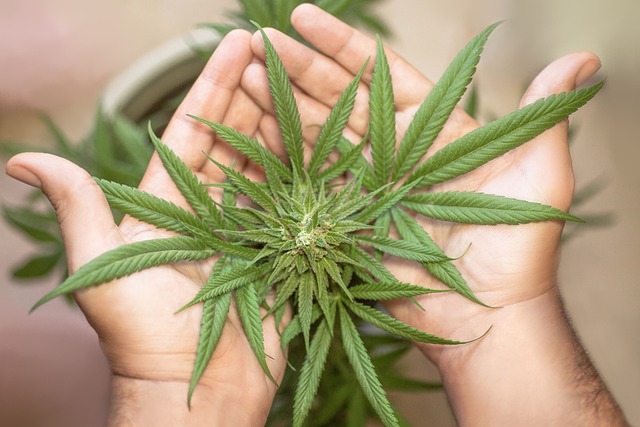
The THCA flower, derived from hemp and rich in the non-psychoactive compound tetrahydrocannabinolic acid (THCA), offers a range of potential health benefits. It acts on the endocannabinoid system to provide anti-inflammatory effects, which are particularly useful for managing chronic inflammation and acute pain without psychoactive side effects. Research indicates that THCA flower may also offer neuroprotective qualities by shielding neuronal cells from damage and reducing oxidative stress, a factor in neurodegenerative diseases. Additionally, THCA is noted for its ability to alleviate anxiety and stress without causing the "high" associated with THC, promoting a state of relaxed focus. Its anti-inflammatory properties are also believed to lower the risk of anxiety disorders by reducing body-wide inflammation. As an antioxidant, THCA is considered as effective as vitamins C and E, making it a valuable addition for overall health maintenance. The THCA flower's antioxidant and anti-inflammatory properties may also bolster the immune system, which has led to its growing popularity in holistic wellness routines, particularly for those interested in natural ways to support their immune function and enhance overall well-being.
Discover the multifaceted wellness properties of THCA flower, a natural compound emerging as a potential asset for health enthusiasts. This article delves into the therapeutic effects and benefits of THCA flower, exploring its anti-inflammatory and analgesic effects, neuroprotective qualities, and its role in mental clarity and stress relief. Additionally, we’ll uncover its antioxidant capabilities that could bolster overall health and immune function. Join us as we shed light on the scientifically backed advantages of incorporating THCA flower into your wellness regimen.
- Unveiling THCA Flower: A Natural Remedy for Inflammation and Pain Relief
- The Neuroprotective Properties of THCA Flower: Potential Benefits for Neurological Health
- Enhancing Mental Well-being with THCA Flower: Anxiety and Stress Reduction Insights
- Exploring the Antioxidant Powerhouse: How THCA Flower Supports Overall Health and Immune Function
Unveiling THCA Flower: A Natural Remedy for Inflammation and Pain Relief

The THCA flower, a natural compound derived from hemp, has garnered attention for its potential therapeutic properties, particularly in addressing inflammation and providing pain relief. Tetrahydrocannabinolic acid (THCA), the raw form of THC found in cannabis plants, exhibits anti-inflammatory effects that can be beneficial for individuals suffering from chronic inflammatory conditions or acute pain. Studies indicate that THCA interacts with the body’s endocannabinoid system, modulating the activity of cannabinoid receptors and reducing pro-inflammatory cytokines, which play a key role in inflammation. This interaction not only helps alleviate pain but also promotes a decrease in inflamed areas, making it a promising natural remedy for those seeking alternatives to traditional pharmaceuticals. The flower’s effects are largely attributed to its rich profile of cannabinoids, terpenes, and flavonoids, which synergistically contribute to its anti-inflammatory and analgesic benefits. Users often report a sense of well-being and relief from discomfort without the psychoactive effects associated with THC, making the THCA flower an attractive option for pain management and inflammation reduction.
The Neuroprotective Properties of THCA Flower: Potential Benefits for Neurological Health

THCA, or Tetrahydrocannabinolic Acid, is the non-psychoactive precursor to THC found in cannabis plants. The THCA flower, rich in this compound, has been the subject of scientific investigation for its potential neuroprotective properties. Preclinical studies suggest that THCA may offer protective benefits to neuronal cells, which could be beneficial for maintaining neurological health over time. Its interaction with the endocannabinoid system, a complex cell-signaling system identified in the early 1990s, has been implicated in modulating various functions and processes, including neuroprotection.
Research indicates that THCA flower effects may include a reduction in inflammation and oxidative stress, both of which are detrimental to neural health. The anti-inflammatory effects of THCA could be particularly advantageous in managing conditions like neurodegenerative diseases. Additionally, the antioxidant properties of THCA, as evidenced by its presence on the list of U.S. patent 6,630,507, Brevet Cannabinoids, suggest a potential role in safeguarding brain cells from oxidative damage, which is often associated with a variety of neurological conditions. While these findings are promising, further research is necessary to fully understand the extent of THCA flower benefits and how they can be harnessed for improved neurological health outcomes.
Enhancing Mental Well-being with THCA Flower: Anxiety and Stress Reduction Insights

Delta-9 tetrahydrocannabinol (THC) is often highlighted for its psychoactive properties, but its precursor, tetrahydrocannabinolic acid (THCA), offers a range of benefits that can significantly enhance mental well-being. THCA flower effects include the potential to alleviate symptoms of anxiety and stress without the psychoactive “high” associated with its decarboxylated form. Studies suggest that THCA interacts with the body’s endocannabinoid system, which regulates mood, pain sensation, memory, and other critical functions. This interaction may lead to a calming effect and help users manage their stress levels more effectively. Users report feeling relaxed yet focused, capable of maintaining mental clarity while experiencing a sense of tranquility.
Furthermore, the anti-inflammatory properties of THCA flower are also being explored for their role in mental health. Chronic inflammation within the body has been linked to heightened stress responses and an increased risk of developing anxiety disorders. By reducing inflammation, THCA may contribute to a more balanced state of mind. Additionally, its potential neuroprotective effects could offer long-term benefits for maintaining mental health. As research continues to unfold, users are increasingly turning to THCA flower as a natural alternative to manage symptoms of anxiety and stress, offering a promising avenue for those seeking holistic approaches to mental wellness.
Exploring the Antioxidant Powerhouse: How THCA Flower Supports Overall Health and Immune Function

The THCA flower, rich in tetrahydrocannabinolic acid (THCA), has garnered attention for its potential health benefits, particularly as an antioxidant powerhouse. THCA, the non-psychoactive precursor to the more well-known compound Delta-9-THC, has been studied for its therapeutic properties. Its efficacy in supporting overall health and immune function stems from its ability to engage with the body’s endocannabinoid system. This interaction is thought to assist in neutralizing free radicals, which are unstable molecules that can cause oxidative stress and contribute to various diseases. The antioxidant effects of THCA flower are comparable to other well-known antioxidants like vitamins C and E, making it a valuable addition to health maintenance regimens. Moreover, the anti-inflammatory properties associated with THCA may aid in modulating immune responses, potentially offering protective effects against inflammatory conditions. Research suggests that incorporating THCA flower effects and benefits into one’s wellness routine could contribute significantly to a robust defense mechanism, promoting vitality and health. As interest in natural remedies and preventative healthcare grows, the role of THCA-rich flowers in supporting immune function becomes increasingly relevant.
In conclusion, the therapeutic potential of THCA flower offers a multifaceted approach to enhancing health and well-being. From its promising anti-inflammatory and pain-relieving properties to its neuroprotective capabilities that could benefit those with neurological conditions, the THCA flower emerges as a significant natural remedy. Its role in mental well-being, particularly in reducing anxiety and stress, further underscores its importance. Additionally, the antioxidant benefits of THCA flower contribute to overall health and immune function, making it a compelling option for those seeking to harness its effects and benefits. As research continues to evolve, the versatility and potential applications of THCA flower are likely to expand, providing a natural alternative with profound implications for health and medicine.







